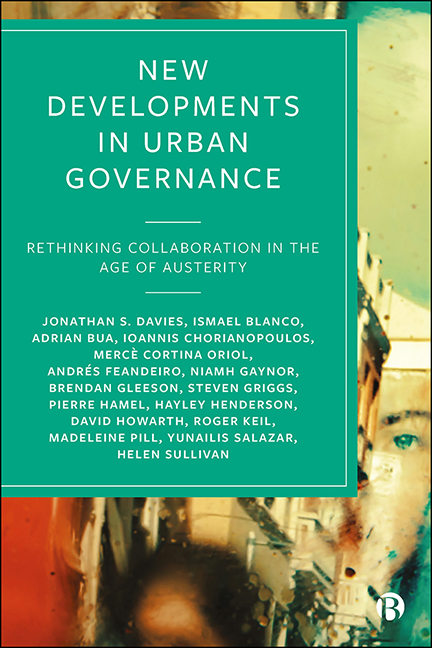Book contents
- Frontmatter
- Contents
- List of Figures and Tables
- Acknowledgements
- Introduction
- 1 Crisis and Austerity in Eight Cities: An Overview
- 2 Collaborative Governance After the Global Economic Crisis
- 3 Austerity Governance, Political Resistance and Urban Transformation
- 4 Rescaling through Austerity Governance
- 5 The Local State in Austerity Governance
- 6 Urban Cultural Diversity and Economic Migration in Austere Times
- 7 Conclusion
- Afterword: From Austerity to COVID-19 and Beyond
- Notes
- References
- Bibliography of Working Papers
- Index
3 - Austerity Governance, Political Resistance and Urban Transformation
Published online by Cambridge University Press: 15 September 2022
- Frontmatter
- Contents
- List of Figures and Tables
- Acknowledgements
- Introduction
- 1 Crisis and Austerity in Eight Cities: An Overview
- 2 Collaborative Governance After the Global Economic Crisis
- 3 Austerity Governance, Political Resistance and Urban Transformation
- 4 Rescaling through Austerity Governance
- 5 The Local State in Austerity Governance
- 6 Urban Cultural Diversity and Economic Migration in Austere Times
- 7 Conclusion
- Afterword: From Austerity to COVID-19 and Beyond
- Notes
- References
- Bibliography of Working Papers
- Index
Summary
Our book details and documents the impact of austerity governance on a selection of cities. Yet for some commentators, cities and urban spaces remain the ‘new theatres of struggle’ in our contemporary condition (Hamel, 2014). This chapter critically assesses the forms of social and political resistance that emerged across the eight cities in our study. Building on themes introduced in Chapters 1 and 2, it argues that cities serve as crucibles for a diverse set of political contestations, responses and initiatives, but they exhibit differential capacities to shape their environments. Indeed, it demonstrates the complex ‘mix’ of political traditions, institutions, socio-economic structures, practices and ideological systems that come together to constitute the city as a political engine. In so doing, we draw particular attention to the shifting locus of resistance to austerity across communities and neighbourhoods. Our analysis and evaluation suggest that the future projection of cities as ‘spaces of hope’ rests on the twin challenges of ‘scaling up’ neighbourhood protests into broad and anti-systemic political projects, while reinvesting in the construction of progressive relations with the local state that open local spaces of manoeuvre to challenge national regimes of austerity.
Against this background, we turn first to our initial presentation and discussion of the eight cities, focusing on Melbourne, Barcelona and Nantes, whose distinctive characteristics provide the parameters for the analysis of all the cases. We then examine and describe the cases of Athens, Baltimore, Dublin, Leicester and Montréal, analysed here as in Chapter 1 through the lens of austerity realism. Finally, we focus on the cities of Barcelona and Nantes, which we deem to be exemplary cases of cities that have most contributed to social and political change, both in terms of the development of creative governance arrangements, and with respect to the social movements and political groups that have emerged within and beyond the official spaces of politics. Our characterization and evaluation establish the potentials, limits and contingency of new urban struggles and politics, whose forms are shaped by a concatenation of variables at multiple levels of analysis, and we conclude by setting out the challenges faced by these incipient and in many cases fleeting forms.
- Type
- Chapter
- Information
- New Developments in Urban GovernanceRethinking Collaboration in the Age of Austerity, pp. 50 - 66Publisher: Bristol University PressPrint publication year: 2022



